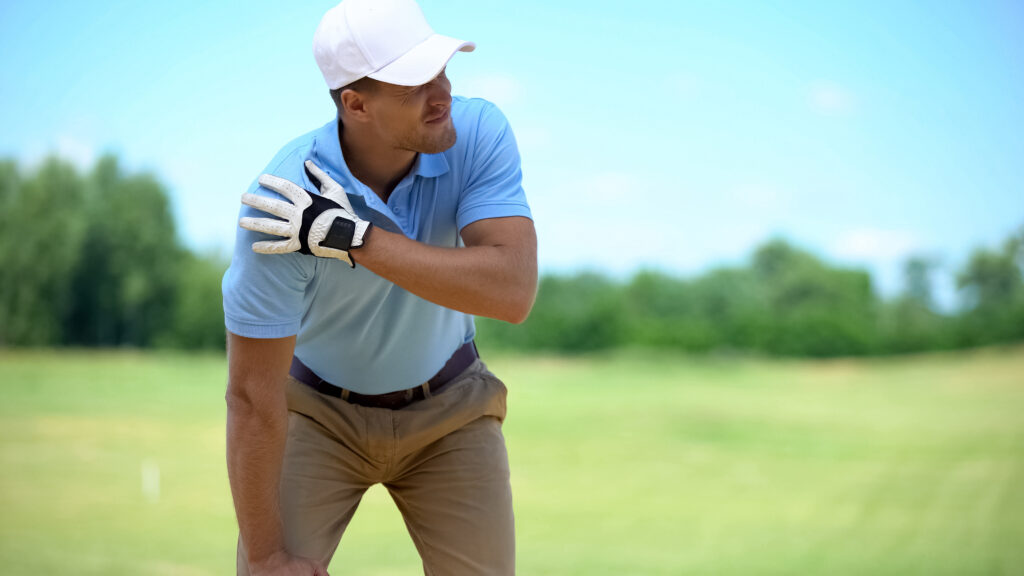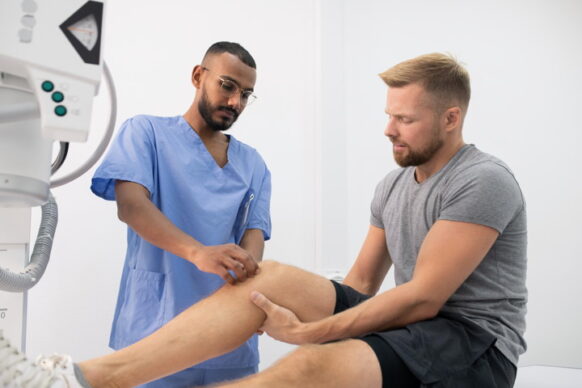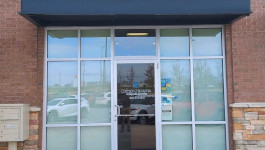Sports Medicine: Avoiding Common Golf Injuries

Golf is typically a very safe sport, but underneath the hopefully graceful arc of the golfer’s swing is a complicated series of movements with plenty of potential to cause damage to the arms, shoulders, back, and other parts of the body.
Whether it’s caused by improper form, repetitive motion, or just a confluence of unfortunate occurrences, golfers of all ages commonly experience injuries requiring the attention of a sports medicine doctor.
Here is a list of some of the most common golf injuries, how to avoid them, and how OrthoGeorgia’s orthopaedic specialists can help when a trip to the course becomes a trip to the doctor’s office.
Common Golf Injuries
Not surprisingly, most golfing injuries occur in the shoulders, arms, and back. But leg, knee, and ankle injuries are also a common occurrence. Most golfing injuries take the form of one or more of these conditions:
- Lower Back Pain: Common among amateur golfers, lower back pain is usually the result of a strain injury in the muscles of the lower back. A strain is typically caused by improper warm-up, poor form, or overswinging.
- Rotator Cuff Injuries: A tear, sprain, or overuse injury of the muscles and four tendons surrounding the shoulder joint. It is usually brought on in golfers through poor form, overswinging, or dropping the trailing shoulder.
- Tennis Elbow (lateral epicondylitis): An overuse injury affecting the muscle tendon that runs down the outside of the forearm. Repetitive motion causes small tears in the tendon, leading to inflammation and pain.
- Golfer’s Elbow (medial epicondylitis): An overuse injury affecting the muscle tendon that runs down the inside of the elbow. This is the most common arm/elbow injury among golfers.
- Tendonitis: Short-term inflammation of a muscle tendon due to stress or irritation. It usually occurs in the arms or wrists of golfers but can occur in nearly any tendon.
Avoiding Injury on the Course
Pre-Round Tips
As with any athletic activity, proper stretching and warm-up before a round of golf is vital. Properly warmed-up muscles perform better, are more flexible, and are less susceptible to injury. Plus, when you’re correctly stretched out and warmed up, you’ll play better, and who wouldn’t want to be safer and shave a few strokes?
Rather than the usual pre-game routine – pulling up to the course five minutes before your tee time, grabbing some water, maybe taking a few swings on the range, and then hitting the first tee box – arrive a little earlier to give yourself time to physically prepare for the next 18 holes.
Take a brisk walk for 5-10 minutes (maybe down to the first green and back – get exercise and check green conditions) before starting to get the blood flowing and loosen up the muscles in your legs and arms. Then, begin a stretching routine that includes the following exercises:
Hip Hinge (10 reps)
- Hold a club by the middle of the shaft, hands slightly more than shoulder-width apart.
- Let your arms hang naturally so that the club is at hip height.
- Bending at the waist and pushing your hips back, slowly let the club ride down the front of your legs until you feel the stretch in the back of your legs.
- Hold for a moment, then slowly straighten up.
Hip Opener (10 reps per side)
- Kneel and extend one leg straight to the side, keeping the knee straight.
- Lean forward, keeping your spine straight, and place your hands on the floor or ground in front of you.
- Slowly rock your hips back and forth towards your heels, feeling the stretch on the inner thigh of the straightened leg.
- Repeat on the other leg.
Thoracic Rotation (10 reps per side)
- Stand with feet shoulder-width apart.
- Take one long step forward with your right foot, so that you are now standing in a split stance.
- Holding a club out in front of you with both hands, arms fully outstretched, slowly rotate your upper body to the right, keeping your head facing forward.
- Repeat on the other side.
Pelvic Tilt (10 reps)
- Stand in your addressing position, but with arms crossed over your chest.
- Keeping the upper and lower body as still as possible, rock your pelvis back and forth, arching and flattening the lower back (yoga practitioners will recognize this movement as similar to an upright cat-cow exercise).
Half-Kneel Ankle Stretch (10 reps per side)
- Kneel with one knee on the ground and the other out in front (as if you were proposing to someone).
- Cross your arms over your chest.
- Keeping toes, knees, and hips in a straight line, lean your upper body forward.
- Repeat on the other side.
Side Step to Rotation (8 reps per side)
- Stand in your addressing position, but with legs together and arms crossed over your chest.
- Slowly step to one side and rotate your body (as if you were starting your backswing in that direction), then return to the center.
After stretching, consider an even more in-depth warm-up by walking the first few holes. If your course is built on a compact layout, you may be able to easily leave your cart on the third or fourth tee box; if not, you may need to alternate walking and riding with your partner. Or, treat every day as “Cart Path Only” and make the trek across the fairway to your ball after each stroke.
Always Use Proper Form
Many injuries in golf can be the result of improper form. Loss of posture before or during the swing, overswinging, overuse of the shoulders or elbows in a swing, dropping the trailing shoulder, or nearly any other error in technique can cause the body to move in an unexpected way, leading to injury.
If you’re new to golf, consider taking lessons from a local professional to learn the proper technique. With a clean, correct swing, you’ll put less stress on your body and will be able to make accurate, full-distance shots without having to exert as much effort.
But these injuries aren’t specific to new and inexperienced golfers. Even the most experienced players can fall apart when the pressure hits – or when frustration sets in after your third bunker shot rolls back down to your feet.
Every time you address the ball, take a deep breath and relax before starting your backswing. Take practice swings if you need to to ensure your motions are smooth, clean, and precise. Your swing is never the place to concern yourself with pace of play – take your time and do it right.
Titleist Performance Institute
If you’ve suffered an injury in the past, or if you find that your swing is getting choppier, less consistent, or painful, OrthoGeorgia may be able to protect you from future injuries and reduce your scores!
Since 2020, OrthoGeorgia has offered the Titleist Performance Institute (TPI) program as part of our sports medicine practice. TPI at OrthoGeorgia provides golfers with a comprehensive biomechanical analysis of their swing and in-depth guidance on improving their safety and performance.
In a TPI screening, physical therapy patients or those looking to improve their game will receive a comprehensive, individualized plan for improving their swing and reducing their risk of injury.
After an Injury
If you’ve suffered a severe injury, on or off the course, or the effects of aging have required orthopaedic work such as joint replacement, all is not lost. Golf is a forgiving game, and it’s routinely and regularly enjoyed by players of all ages, regardless of their medical history.
Consider our friend and former OrthoGeorgia physician, Dr. Emory Johnson, Jr. Even after a spinal fusion, total hip replacement, and total knee replacement, he can still enjoy a round with friends!
Whether correcting a minor fault in the swing or repairing significant joint damage due to age or a sporting injury, OrthoGeorgia’s board-certified sports medicine doctors and skilled physical therapists can help get you back on the fairway.
Does a Golfing Injury Have You Lost in the Rough? Call Us at (478) 745-4206 Today!
Disclaimer: The information contained within this material is intended for informational purposes only. No material in this content is intended to be a substitute for professional medical diagnosis, treatment, or advice. Always seek the advice of your physician or other healthcare provider with questions regarding your medical conditions and treatment options.

Personalized Orthopaedic Care in Central Georgia
At OrthoGeorgia, we want to help you live a healthier and more comfortable life by giving those in Macon, Warner Robins, Kathleen, Milledgeville, Dublin, Hawkinsville, and the surrounding areas convenient access to the highest quality care. Whether you have been suffering from a sports injury or a common orthopaedic condition, we will determine the cause of your discomfort and craft a personalized treatment plan to bring you relief. To learn more about our services and our physicians, or to schedule an appointment at OrthoGeorgia, please contact us today.







